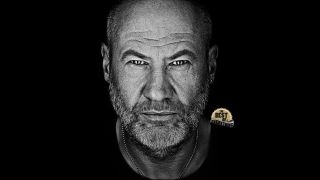Fish released four studio albums with Marillion before leaving the band to pursue a solo career in 1988. Since then, he’s released 10 studio albums, the most recent being 2013’s A Feast of Consequences.
Here are the 10 songs that have shaped his 32-year recording career…
FUGAZI (Marillion: Fugazi, 1984)
“Let’s start with the title track from the second [Marillion] album: Fugazi. That was a big jump forward for us, you know. It’s a very strong song, and what I’m going to pick for this list is strong songs from throughout my career. I was living in Earl’s Court at the time, and I was going up to the Marquee Club on Wardour Street. I remember being on the Piccadilly Line of the [London] Underground, and writing a lot of the material there. It was a very dark song, but it became a really powerful live track for us. It brought us more into a straightforward rock ethic, and The Who influences really kind of climbed out. I found the word ‘Fugazi’ in a book by Mark Baker called Nam [The Vietnam War in the Words of the Men and Women Who Fought There], and it was just kind of how I felt at that time. We were still trying to make a name for ourselves and bust out of the divisions as far as success was concerned, and I was dibbling and dabbling with various things at that time too, so that’s why Fugazi was a far darker album than Script [for a Jester’s Tear].”
KAYLEIGH (Marillion: Misplaced Childhood, 1985)
“I have to go with Kayleigh. It was the piece that made us, and destroyed us. If you look at the actual songwriting though – the structure, melody and solo – it’s close to being the perfect pop-rock song. The lyrics were agonising to write. The guys went out for dinner one night, and they told me when they got back they wanted the lyrics finished. So they went out for the standard Marillion Berlin dinner, which consisted of some food and a lot of tequila. They rolled back into the studio at about one in the morning, and I’d finished the lyric. So we recorded it there that night. Misplaced was a really important album for me, because I got into songwriting and editing myself in a big way. And the imagery on Kayleigh is so intense, and the chorus as it stands is just instantly memorable. I guess it’s a song that a lot of the old diehard fans thought we’d sold out on, but as a song it’s one of the ones that I’m incredibly proud of. I did get bored of singing it for a while, but I’m really enjoying it again now.”
**SUGAR MICE **(Marillion: Clutching at Straws, 1987)
“Steve Rothery [guitar] and I recorded a demo of this song, and it was brilliant: the feel, the pace – everything was stunning. But somebody wiped the goddamn tape. So we had to re-record it for the Clutching at Straws album, and over the years it’s developed a different groove to it with different dynamics again. I love the lyrics on it as well. I wrote them in Milwaukee when we were out on a US tour. I ended up in some shit hotel, imagining what it would be like if somebody left their wife and kids in Scotland or whatever, and went half way across the world and ended up in a horrible hotel with a disgustingly sad bar downstairs. We checked in on a Sunday, and all you saw out the window was the dealers standing out on the corner, and that’s kind of what the song was about.”
**VIGIL **(Fish: Vigil in a Wilderness of Mirrors, 1990)
“I remember singing the first section of this song to the rest of the guys in Marillion in a garage near Aylesbury, and they just looked at me as if to say, “Nah!” Ha ha. When I split from the band I started working with Mickey Simmonds, and we started to develop a great writing partnership. I was very nervous at that time, but also very proud because I was starting all over again. And this was one of those songs that was very relative to the state of mind that I was in at that time, with all the confusion that was going on. And again, it stands the test of time. It’s so powerful from a melodic and dynamic sense, and there’s absolutely no fat on it. It’s tight and quick, and it’s always been a big one on the stage for me.”
THE COMPANY (Fish: Vigil in a Wilderness of Mirrors, 1990)
“This was an interesting song because the lyric was actually written before I left Marillion. At that time the band we were all over the place. We’d split into two really – there was me, and then the rest of them. The rest of them were all complaining that I wasn’t writing lyrics of any use. The stuff I was writing was either too Scottish or too political, and it wasn’t suiting them. And I was complaining about the fact that they weren’t writing me songs or providing me with music to set lyrics to. I was frightened that we were going to be out of work, and I wanted to get more into traditional songwriting, so I went to meet Bob Ezrin – who was nominated to produce the album that was going to follow Clutching at Straws – after a Pink Floyd gig at Wembley. I went to his place in Maida Vale and presented him with my lyric book, and he told me there was some good stuff in there. I told him I wanted to write a song like Leonard Cohen’s Bird on the Wire, because everyone said I was drinking too much, which he encouraged me to write. So I went away and wrote The Company. It’s always been a real standard tune in the set wherever I play, because it’s a really fun song and people just jump at it.”
**JUST GOOD FRIENDS **(Fish feat. Sam Brown: Yin and Yang, 1995)
“This was originally done for the Internal Exile album, and I originally wanted to do it as a duet. I approached various female singers to come and sing it with me, but nobody was particularly interested. Chris Kimsey was producing the album, and in the end we just ran it as a straightforward single vocal. Internal Exile was a strange album because it was my second solo album, I’d come through Vigil [in a Wilderness of Mirrors] having had a conflict with EMI over recording contracts, and I just wasn’t in a particularly great frame of mind. I didn’t know what direction I was going in either, so the entire album was kind of loaded with lots of different types of songs. And Just Good Friends took on this kind of country-western rock vibe. I really enjoyed writing it though, and I always felt we should have done a lot more with it, which is why I revisited it in 1995 for the Yin and Yang ‘Best of’ collection. That was when I decided to re-record it, and we got in Sam Brown. That version is still an all time favourite of mine, and it still defies me as to why it never became a really big hit. It’s a deeply personal, very heartfelt song.”
**THE PERCEPTION OF JOHNNY PUNTER **(Fish: Sunsets on Empire, 1997)
“Working with Steven Wilson on this album was fantastic. He came in to co-write and produce it, and I remember when we started to put the whole thing together Steven helped me achieve a very heavy, modern, guitar orientated sound, which was really inspiring for me. I’d just been out to Bosnia the year before, and the track was inspired by my time out there. It’s interesting because the lyrics still seem so pertinent with what’s happening in Europe at the moment.”
**TITLED CROSS **(Fish: Raingods with Zippos, 1999)
“This song was also inspired by my experiences out in Bosnia, and particularly the landmines. I went down there when the whole situation was still kind of raw, and I was given mine awareness lessons. After I was told what to look out for I was taken out to a grassy area with a load of defused mines, and we had to look out for them. And when I came back from Bosnia I was much more aware of where I was walking and what I was walking on, and it took me weeks and weeks to stop doing that. I was conscious that I couldn’t stop looking at what was on the ground, and that was what the song was inspired by. As the years have gone on it’s still a very relevant song, because there’s still so many unmarked and undiscovered landmines in countries like Bosnia.”
ARC OF THE CURVE (Fish: 13th Star, 2007)
“This was another one of those singles that went missing. I thought that we had a really good radio track here, but again it didn’t happen. It was another very emotional time as I was writing and recording the album, too. I still remember the emotions running very high in the studio as we went in to record, and I struggled at times to keep it together and keep on doing it. Calum Malcolm was producing, and there was a lot of stuff that I asked him to take it out, but he said we had to leave it in because it was so raw.”
**HIGH WOOD **(Fish: A Feast of Consequences, 2013)
“I found High Wood incredibly inspiring to write. It seems strange to single that song out because those five songs off A Feast of Consequences were written to work together, but it was my attempt to put some of my family history into music. The idea initially was to write one fifteen minute song, but I suddenly realised I wasn’t going to be able to encompass everything that I was trying to write about within that dynamic. So that’s where I got the idea to write five songs, with High Wood being the plaintive piece at the front with the piano, going into a more up-tempo thing with Crucifix Corner, going into The Gathering which was even more up-tempo, then into the really heavy Thistle Alley, and finally soft piano of The Leaving. When I started to write this section and declared my intentions to do it as five songs, it was pretty daunting at first. But once I got into it and started moving towards the end, I felt like it could’ve developed into an entire album on its own. But I held myself back.”
Fish tours the UK in December. Click here for full details.


